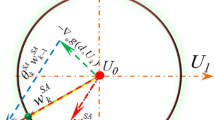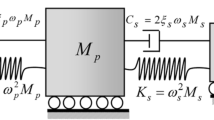Abstract
The efficiency and robustness of reliability analysis methods are important factors to evaluate the probabilistic constraints in reliability-based design optimization (RBDO). In this paper, a relaxed mean value (RMV) approach is proposed in order to evaluate probabilistic constraints including convex and concave functions in RBDO using the performance measure approach (PMA). A relaxed factor is adaptively determined in the range from 0 to 2 using an inequality criterion to improve the efficiency and robustness of the inverse first-order reliability methods. The performance of the proposed RMV is compared with six existing reliability methods, including the advanced mean value (AMV), conjugate mean value (CMV), hybrid mean value (HMV), chaos control (CC), modified chaos control (MCC), and conjugate gradient analysis (CGA) methods, through four nonlinear concave and convex performance functions and three RBDO problems. The results demonstrate that the proposed RMV is more robust than the AMV, CMV, and HMV for highly concave problems, and slightly more efficient than the CC, MCC, and CGA methods. Furthermore, the proposed relaxed mean value guarantees robust and efficient convergence for RBDO problems with highly nonlinear performance functions.






Similar content being viewed by others
References
Aoues Y, Chateauneuf A (2010) Benchmark study of numerical methods for reliability-based design optimization. Struct Multidiscip Optim 41:227–294
Beck AT, Gomes WJS (2012) A comparison of deterministic, reliability-based and risk-based design optimization. Probabilistic Eng Mech 28:18–29
Cheng G, Xu L, Jiang L (2006) A sequential approximate programming strategy for reliability-based structural optimization. Comput Struct 84(21):1353–1367
Cho TM, Lee BC (2010) Reliability-based design optimization using a family of methods of moving asymptotes. Struct Multidisc Optim 42:255–268
Der Kiureghian A, Stefano MD (1991) Efficient algorithm for second-order reliability analysis. J Eng Mech 117(12):2904–2923
Du X, Chen W (2004) Sequential optimization and reliability assessment method for efficient probabilistic design. J Mech Des 126:225–233
Du X, Huang B (2007) Reliability-based design optimization with equality constraints. Int J Numer Meth Engng 72:1314–1331
Ezzati G, Mammadov M, Kulkarni S (2015) A new reliability analysis method based on the conjugate gradient direction. Struct Multidisc Optim 51(1):89–98
Gu L, Yang RJ, Cho CH, Makowski M, Faruque M, Li Y (2001) Optimization and robustness for crashworthiness. Int J Veh Des 26:348–360
Hao P, Wang B, Li G, Meng Z, Wang L (2015) Hybrid framework for reliability-based design optimization of imperfect stiffened shells. AIAA J 53(10):2878–2889
Hasofer AM, Lind NC (1974) Exact and invariant second moment code format. J Eng Mech Div 100(1):111–121
Keshtegar B (2016a) Stability iterative method for structural reliability analysis using a chaotic conjugate map. Nonlinear Dynam 84(4):2161–2174
Keshtegar B (2016b) Chaotic conjugate stability transformation method for structural reliability analysis. doi:10.1016/j.cma.2016.07.046
Keshtegar B, Hao P (2016) A hybrid loop approach using the sufficient descent condition for accurate, robust and efficient reliability-based design optimization. J Mech Design. doi:10.1115/1.4034173
Keshtegar B, Miri M (2013) An enhanced HL-RF method for the computation of structural failure probability based on relaxed approach. Civil Eng Infrastruct 1(1):69–80
Keshtegar B, Miri M (2014) Introducing conjugate gradient optimization for modified HL-RF method. Eng Comput 31(4):775–790
Keshtegar B, Hao P, Meng Z (2016) A self-adaptive modified chaos control method for reliability-based design optimization. Struct Multidiscip Optim, 1–13, DOI 10.1007/s00158-016-1471-9
Lee JO, Yang YS, Ruy WS (2002) A comparative study on reliability-index and target performance-based probabilistic structural design optimization. Comput Struct 80:257–269
Lee I, Choi KK, Du L, Gorsich D (2008a) Dimension reduction method for reliability-based robust design optimization. Comput Struct 86(13):1550–1562
Lee I, Choi KK, Du L, Gorsich D (2008b) Inverse analysis method using MPP-based dimension reduction for reliability-based design optimization of nonlinear and multi-Dimensional systems. Comput Methods Appl Mech Eng 198(1):14–27
Lee I, Noh Y, Yoo D (2012) A novel second-order reliability method (SORM) using non-central or generalized chi-squared distributions. J Mech Design 124(10):100912
Li G, Meng Z, Hu H (2015) An adaptive hybrid approach for reliability-based design optimization. Struct Multidiscip Optim 51(5):1051–1065
Liang J, Mourelatos ZP, Tu J (2008) A single-loop method for reliability-based design optimization. Int J Product Develop 5:76–92
Lim J, Lee B, Lee I (2014) Second‐order reliability method‐based inverse reliability analysis using Hessian update for accurate and efficient reliability‐based design optimization. Int J Numer Meth Eng 100(10):773–792
Lin JH, Che WY, Yu YS (1982) Structural optimization on geometrical configuration and element sizing with statical and dynamical constraints. Comput Struct 15(5):507–515
Meng Z, Li G, Wang BP, Hao P (2015a) A hybrid chaos control approach of the performance measure functions for reliability-based design optimization. Comput Struct 146:32–43
Meng Z, Hao P, Li G, Wang B, Zhang K (2015b) Non-probabilistic reliability-based design optimization of stiffened shells under buckling constraint. Thin Wall Struct 94:325–333
Mohsine A, Kharmanda G, El-Hami A (2006) Improved hybrid method as a robust tool for reliability-based design optimization. Struct Multidisc Optim 32:203–213
Nikoladis E, Burdisso R (1988) Reliability-based optimization: a safety index approach. Comput Struct 28(6):781–788
Rackwitz R, Fiessler B (1978) Structural reliability under combined load sequences. Comput Struct 9:489–494
Rashki M, Miri M, Azhdary MM (2014) A simulation-based method for reliability based design optimization problems with highly nonlinear constraints. Automat Constr 47:24–36
Shan S, Wang GG (2008) Reliable design space and complete single-loop reliability-based design optimization. Reliab Eng Syst Safe 93:1218–1230
Shi ZJ, Wang S, Xu Z (2010) The convergence of conjugate gradient method with nonmonotone line search. Appl Math Comput 217:1921–1932
Tu J, Choi KK, Park YH (1999) A new study on reliability-based design optimization. J Mech Des 121(4):557–564
Valdebenito MA, Schuëller GI (2010) A survey on approaches for reliability-based optimization. Struct Multidiscip Optim 42:645–663
Yang D (2010) Chaos control for numerical instability of first order reliability method. Commun Nonlinear Sci Numer Simulat 5:3131–3141
Yang D, Yi P (2009) Chaos control of performance measure approach for evaluation of probabilistic constraints. Struct Multidisc Optim 38(1):83–92
Youn BD, Choi KK (2004) An investigation of nonlinearity of reliability-based design optimization approaches. ASME J Mech Des 126(5):403–411
Youn BD, Choi KK, Park YH (2003) Hybrid analysis method for reliability based-design optimization. ASME J Mech Des 125(3):221–232
Youn BD, Choi KK, Du L (2005a) Adaptive probability analysis using an enhanced hybrid mean value method. Struct Multidisc Optim 29:134–148
Youn BD, Choi KK, Liu D (2005b) Enriched performance measure approach for reliability-based design optimization. AIAA J 43(4):874–884
Young DM (1971) Iterative solution of large linear system. Academic, New York
Zou T, Mahadevan S (2006) A direct decoupling approach for efficient reliability-based design optimization. Struct Multidisc Optim 31:190–200
Author information
Authors and Affiliations
Corresponding author
Rights and permissions
About this article
Cite this article
Keshtegar, B., Lee, I. Relaxed performance measure approach for reliability-based design optimization. Struct Multidisc Optim 54, 1439–1454 (2016). https://doi.org/10.1007/s00158-016-1561-8
Received:
Revised:
Accepted:
Published:
Issue Date:
DOI: https://doi.org/10.1007/s00158-016-1561-8




